By Richard Skanse
Like many Roky Erickson fans, Ryan Lee first heard the news about the 71-year-old godfather of psych rock’s death last month on Facebook. The earliest posts that Friday afternoon, pitched as rumor, were all-too-soon confirmed, and Lee took the news hard. “I actually had to leave work early, because I was just so upset,” he says.
Lee, who plays guitar in the Austin/San Marcos-based rock trio Crypt Trip, was still in a state of shock when he called the band’s bassist — and his best friend since childhood — Sam Bryant, to share his grief. Only it turned out Bryant hadn’t heard the news yet. Neither had the next friend he called, Caleb Dawson, drummer for Austin’s Bad Lovers.
“In a way, I was actually kind of glad that they didn’t find out about it the way I did,” Lee admits. “But it still broke my heart to have to be the one to tell them.”
Lee and Bryant, both 25, and Dawson, 30, were all born well after the ’60s heyday of the 13th Floor Elevators. They weren’t even around yet for Erickson’s first comeback, post Elevators and infamous electroshock treatments at Rusk State Hospital for the criminally insane, as a cult-favorite solo artist in the ’70s. Nevertheless, the Roky they mourned was more than just another lost legend and formative influence on their own music. Much to their lingering disbelief in the wake of his passing, he was a hero that they all came to regard as an actual friend — thanks to the handful of weeks in late 2018 and early 2019 that they spent touring with Erickson on what turned out to be the Rok’s last roll, culminating with a triumphant Easter Eve resurrection of the Elevators’ seminal sophomore album, 1967’s Easter Everywhere.
“It doesn’t really feel real,” says Bryant. “I mean, everybody knew that he had health issues, so we knew it was looming. But you’re always thinking like, it’ll be five or 10 years or whatever. You never think it’s going to be tomorrow. Because that’s not how people think.”
Nearly as hard for Bryant to wrap his head around, though, are the experiences he and his two friends shared with Erickson in the last year of his life: from playing Roky classics like “You’re Gonna Miss Me,” “Two Headed Dog,” and “Starry Eyes” night after night for packed audiences of diehard fans to, well, just getting to spend so many hours in the van with the enigmatic Texas icon as fans themselves.
Dawson was the first of the three formally welcomed into Erickson’s world, back in the winter of 2016. He credits his entry to “an unbelievably simple coincidence and the thoughtfulness of a very kind friend.” After being backed by a number of different Texas-based lineups since his return to regular performing in recent years, ranging from his old band the Explosives to Okkervil River and the Black Angels, Roky’s go-to touring band at that point was his son Jegar Erickson’s Hounds of the Baskervilles — which just happened to have an open seat.
“Jegar posted on Facebook that their drummer was leaving and they’d be looking for a replacement, and my friend Kathleen Litteral saw his post and tagged me in the comments, saying, ‘Caleb Dawson is a great drummer!'” Dawson recalls. “I saw that in my notifications and damn near lost my shit, just imagining the gig.”
He definitely had said shit together going into his audition, though. “When I joined the band, I was very familiar with Erickson’s entire life and career,” says Dawson, who’d been a Roky fanatic ever since first moving to Austin at age 19 and catching director Keven McAlester’s acclaimed 2005 documentary, You’re Gonna Miss Me, at a buddy’s house. “Within seconds, I realized that Roky was the culmination of all my musical interests. I quickly became obsessed with him: bought all the records I could find, read everything I could about him. Roky was it for me.”
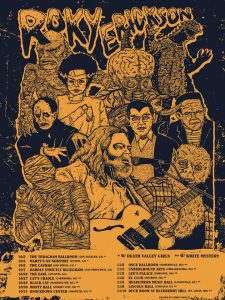
The poster for Roky Erickson’s 2018 fall tour.
Working and playing with Erickson, and slowly getting to know him along the way, did nothing to dim that admiration. “Simply being in his presence made me feel more connected to myself than I could’ve ever imagined,” he says, noting that the first time Erickson addressed him by name, he had to duck out to compose himself. He never took his position in the band for granted, either. “Every time I played with Roky, I felt immense pressure: Pressure to do the songs justice, pressure to make my hero look as good as possible, and pressure to help give the hundreds or thousands of people in the crowd killer versions of the songs they love as much as I do … Every night was an intensely heavy and surreal experience that even after close to 100 shows, never got easier.”
Along with Jegar, who in addition to road managing for his dad also played electric jug in the style of the Elevators’ Tommy Hall, Dawson’s bandmates for his first several months in the Hounds were guitarist Eli Southard (who lives in Missouri) and Austin bassist Jason Richard. But by the time the 2018 fall tour came up on the schedule, the bassist had other commitments — namely his own wedding — and had to exit. Dawson admits that the thought of playing without his rhythm section partner was both sad and scary, noting that Jason was a “big part of the band’s dynamic” and the guy he relied on “to be my lighthouse when Roky would throw us curveballs onstage.” Nevertheless, when Jegar and Eli asked Dawson if he could tap into his network of Austin rock ‘n’ roll connections to find a suitable “ringer,” he was determined not to let them down. And it just so happened that he already knew just the right guy — and he didn’t have to go far to track him down, either.
“I had actually just started working a landscaping job with Caleb,” explains Bryant, who along with Lee befriended Dawson a few years back when Crypt Trip toured with the drummer’s former band, Sweatlodge. “And we were just driving to work one day and he was like, ‘Hey man, we need a new bass player to fill in. You interested?'”
Dawson had to have known it was a stupid question. Hell yes, Bryant was interested — so much so that he ended up blowing off a semester of college to make it happen.
“Caleb gave me a pretty big head’s up about the tour, so I was practicing for like two months beforehand, because I was just extremely nervous,” says Bryant. For the most part, he learned all the songs just playing to the records. Although there were a few all-day rehearsals with the band, he says there were just three short practices with Roky himself in the room before they hit the road for the first leg of the tour: four early October dates in California, culminating with the Hardly Strictly Bluegrass Festival in San Francisco. They were joined for most of that West Coast run by an additional “ringer,” Larry Schemel of Los Angeles’ Death Valley Girls, on rhythm guitar. But Schemel couldn’t make it to the festival gig, and the hole he left was palpable.
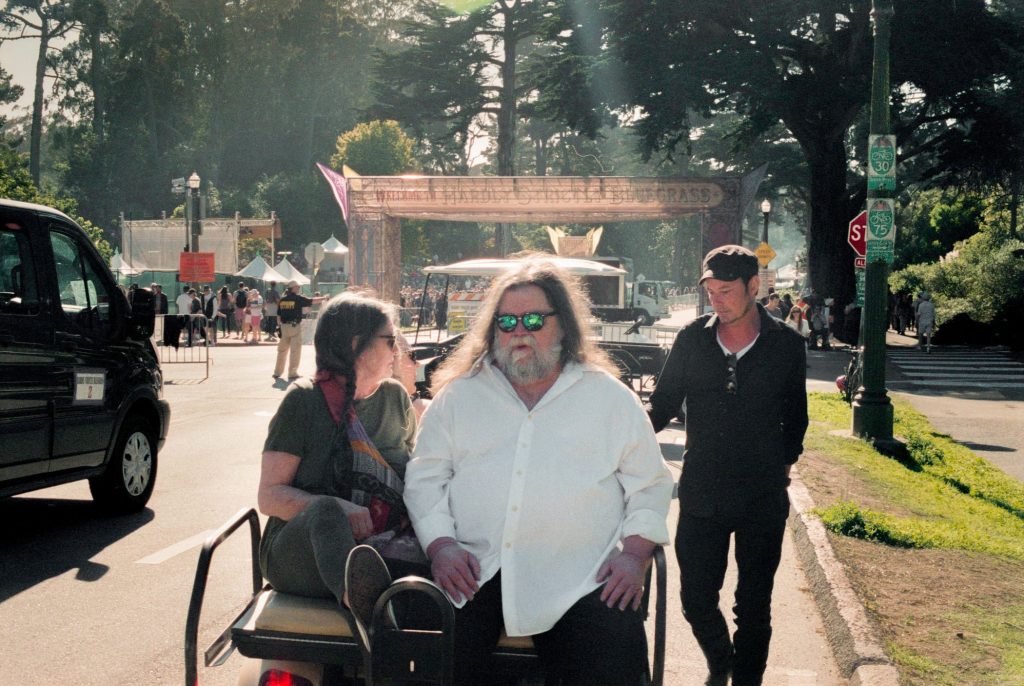
Kingdom of Heaven: Roky Erickson, with wife Dana Morris and son Jegar Erickson, headed to the stage for his Hardly Strictly Bluegrass performance at San Francisco’s Golden Gate Park in October 2018. (Photo by Sam Bryant)
“It was still a good show, but it was definitely a little rough for us because there was just something missing,” explains Bryant. “All of those songs originally had rhythm guitar in them, because Roky always played on them, too, just holding it down. But he doesn’t — or didn’t — really play anymore, apart from on a couple of songs. So after that show we were all like, ‘We really need a regular rhythm guitar player if we’re going to keep doing this.'”
As Dawson puts it, “Playing in front of 10,000-plus people has a way of putting things in perspective.”
Once again, it was the newest guy in the band — this time Bryant — who took the initiative. “Before we’d even loaded our gear off the stage, Sam was on the phone with Ryan, asking if he could clear the next month of his life,” Dawson says. “Thankfully, he could. He learned 20 or so songs on his own over the following couple weeks and we crammed in as many rehearsals as possible before hitting the East Coast.”
Like his two friends who preceded him into the band, Lee’s first encounter with Erickson in person was brief but profoundly impactful. “He didn’t have a lot to say, but he really was kind of this larger than life, mythical character to me,” Lee says. “I remember the first time just hearing his voice, when we were jamming with him in his son’s living room, almost brought me to tears.”
He never got over it, either, even well into his first tour with the band (a 12-city run that kicked off Oct. 27 in Atlanta and finished Nov. 11 in St. Louis). Although Erickson wasn’t in the best physical health, evidenced by his chronic wheezing and need to sit through every show to minimize exertion, the strength of his singing was another matter entirely. “I really didn’t have any expectations at the start,” admits Lee, “but his voice was definitely still there. It’s insane, but he sounded great. Plus the fact that he still knew all the words … it was pretty mind-blowing, honestly. There were so many moments where I could see the crowd just going crazy in front of him, really connecting with him, and I would wonder, ‘what’s going on in his mind right now?’ But I really can’t imagine that he’d be feeling anything other than joy in those moments.”
Bryant agrees. “Every time single time we played together, whether it was practice or a show, I just got the feeling that there was one thing that Roky had consistent in his whole life, and that was music. Almost like that was literally all he knew. I think he was like a time capsule and kind of frozen in his younger days, at least as far as his regular interactions with people went, but he was a completely different person onstage. Playing music just opened him up more than anything else could have ever done. Every time he played, he definitely lit up, and people would always talk about that after a show — because they could see it.”
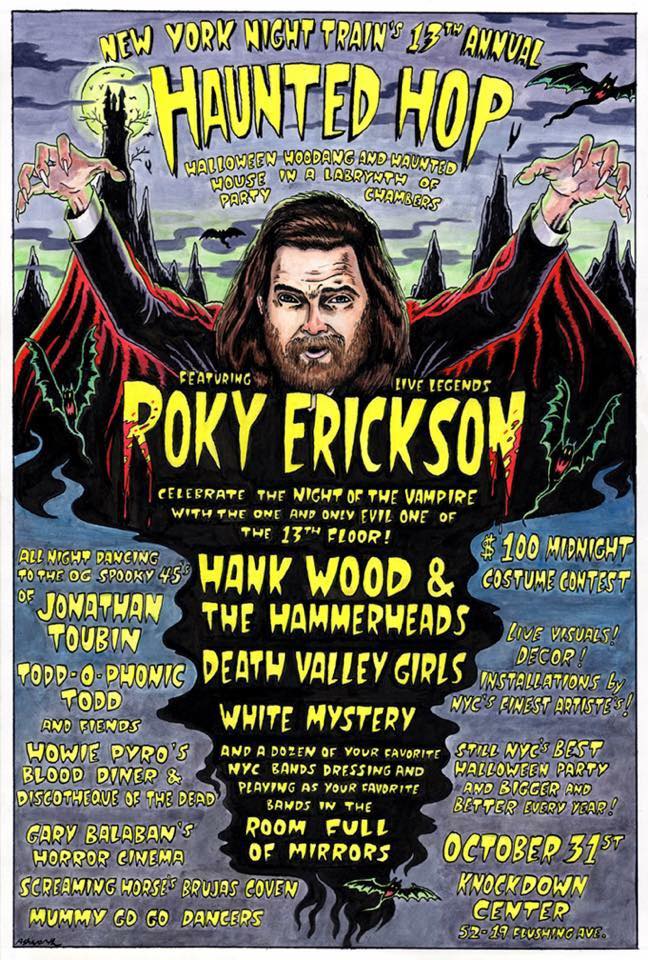
The poster for the 2018 “Haunted Hop” Halloween party in Queens, New York, headlined by “the one and only Evil One of the 13th Floor!”
Apart from the Hardly Strictly Bluegrass Festival gig just before Lee’s recruitment, the biggest show they played on the fall tour was the “Haunted Hop” at the Knockdown Center in Queens. Modestly touted on the poster as “NYC’s best Halloween party,” the epic blow-out featured Erickson (“the one and only Evil One of the 13th Floor!”) headlining a multi-artist bill in front of several thousand revelers, most in costume. “We had debated about dressing up ourselves as different characters from Roky songs, but we didn’t end up doing it because it’s just too hard when you’re on the road to make things like that come together,” says Lee. “But the whole show was crazy. I felt like I was in the Wizard of Oz or something. Everyone else was dressed up, and the whole venue was totally Halloween-ed out, with a haunted house right in the middle of it. It was the perfect setting for a big Roky show.
“A couple of days before that gig, Roky watched Halloween, the first one, like two or three times in a row in the van,” Lee continues with a laugh. “Halloween was definitely his favorite holiday, and we were all getting pumped for it. He just watched that movie over and over again, and we all watched it with him. It was awesome.”
Bryant’s account varies slightly, in that he thinks they might have actually watched the John Carpenter slasher classic four times in a row. “There were just a lot of really intimate moments that we got to spend with Roky like that where you thought, ‘Wow, I can’t believe this is happening right now,'” he says. “Like, ‘I’m going to remember this forever.'”
As Dawson admits, most of their actual conversations with Roky, even during long stretches on the road, “tended to be relatively casual and light.” It was usually a lot easier to get Erickson to talk about whatever horror novel he was reading at the time or even — much to Lee’s delight one time when he was driving and in control of the stereo — to get him singing along to the Beatles’ Rubber Soul than to glean much personal insight from him about his own music or experiences. Fortunately, Dana Morris — Jegar’s mother and Erickson’s first wife, with whom he’d reunited in recent years — accompanied them for the whole tour, and she was a lot more forthcoming in that regard, happily regaling the obsessive young Austin music buffs with first-hand tales and gossip from the “Groovers Paradise” of yore. “She was like an information fountain,” Lee enthuses. But, he adds, every now and then, Erickson himself would surprise them with stories himself — usually when they were least expecting it.
“Sometimes he would get kind of a jolt of memories and flashbacks,” Lee recalls, “and he would just start talking about something, even if nobody else had been talking.”
“Roky always has all of these insanely poignant one-liners, and a lot of times they would come out of complete silence,” adds Bryant, who still can’t help but to inadvertently refer to Erickson in the present tense. “One time in the van, he was just looking out the window, and out of nowhere said, ‘Fuck you — I’m from Texas!’ We all turned to look at him and went like, ‘What?’ And he goes, ‘Who is that?’ We said, ‘It’s Ray Wylie Hubbard, dude.’ And he’s like, ‘Oh yeah — cool!’ (Laughs) But we hadn’t even been listening to Ray at the time. So there were a lot of instances like that, where you were like, ‘What was he thinking that made him say that?'”
After the tour’s completion in early November, the band dispersed for a few months but with plans for more shows throughout 2019, beginning with an Austin show in March for South by Southwest and extending as far ahead as a festival in upstate New York in August. According to Bryant, there was even talk about possibly hitting the studio at some point to begin work on a new album, which would have been Erickson’s first since his 2010 collaboration with Okkervil River, True Love Cast Out All Evil. In the meantime, they all returned to their day jobs and other bands, with Lee and Bryant reconnecting with Crypt Trip drummer Cameron Martin to release their own new album (their third), Haze County, and embark on a short tour of Europe. But they still had Roky on their minds the whole trip, knowing that they would soon be back onstage with him for a two-night stand (April 19-20) at San Francisco’s the Chapel. One album in particular doubtless got a lot of concentrated headphone study on their flight back to the States: the 13th Floor Elevators’ Easter Everywhere, which they would be playing in its entirety on the second night for the first time at least since the album’s release back in the Summer of Love, if not ever.
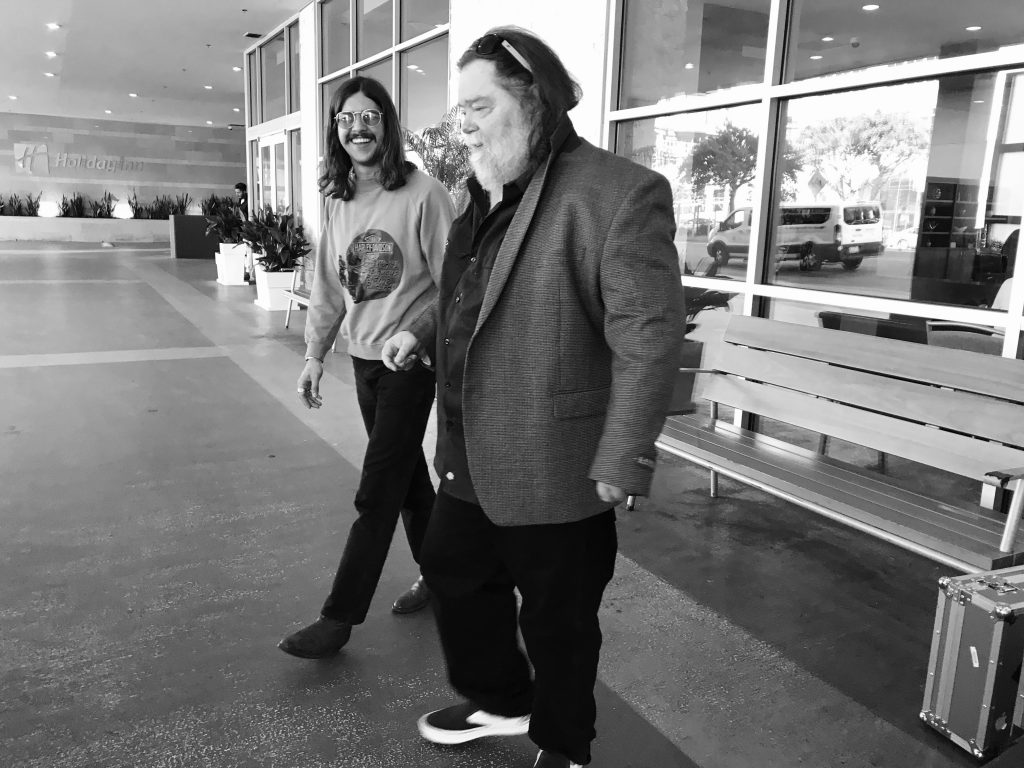
I Have Always Been Here Before: Rhythm guitarist Ryan Lee with Roky Erickson, back in San Francisco in April 2019. (Photo by Brittany Garza)
“I couldn’t have ever known that the Easter Everywhere show would be his last gig, but leading up to it, I knew it was going to be big — and historical,” Lee says. And their window for rehearsal would be tight. “Basically, we got home from Europe, and then had two days to get together as a band and run through everything before we went and did it.”
“We were terrified, to be honest,” admits Bryant. “Not just thinking we were going to be so tired from the trip, jet-lagged as hell, but also because we had to learn Easter Everywhere, which is kind of a hard album. I mean, I was excited, because it’s actually my favorite Elevators album, but like with a lot of their stuff, the recordings weren’t really amazing quality, so we really had to work hard to figure stuff out by ear. We tried our very best to get as close to the record’s sound as we could, because we all knew that’s what we’d want to hear as fans ourselves.”
Adding to that pressure was the fact that Erickson himself had only performed maybe two or three songs from Easter Everywhere (most notably the epic opener, “Slip Inside this House”) in the last few years, with the rest having in all likelihood gone untouched since the ’60s. “That was something we were extremely worried about,” Bryant continues. “I mean, the amount of lyrics Roky sang in his life … given his condition and age, it’s pretty amazing that he was able to still remember as much of that old stuff as he did. A lot of times those Elevators songs don’t even repeat a single line, but he knew a lot of that stuff by heart and it never really fazed him at all. But because he hadn’t sung most of the Easter Everywhere songs in so long, we did try to give him a little help by printing up some lyrics for him; they were just kind of a safety net for him to feel comfortable. Only it was so dark onstage that I don’t think he was even able to read them.”
As it turned out, he never really needed to. “There were times where he did get a little fumbled up, but then he would just bounce right back from it,” Bryant says. “And man, he killed it. We were all just like, ‘holy shit!'”
And, at least as far as they could tell from the way he seemed so engaged, not just with the crowd that night but with the band, too — paying acute attention to every musical cue and actively playing off of them in a way that wasn’t always the case — Erickson might well have been thinking the same thing.
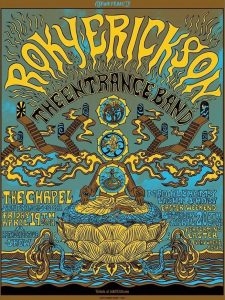
The poster for Roky Erickson’s last two shows — including a very special Easter Eve performance of the 13th Floor Elevators’ “Easter Everywhere” — at the Chapel in San Francisco, April 19-20.
“The moment that really sticks out in my mind is I actually got the honor to play a guitar solo in ‘I Had to Tell You,’ which is one of my favorite songs on the album,” says Lee. “It’s a softer song, and I did kind of a country-ish solo. And I remember right after I started it, Roky looked over at me with this huge smile on his face and gave me a nod, and it just made me like … I swear I almost broke down onstage, but it made me play with so much feeling.”
Call it life imitating art, or maybe art foretelling life. Because the lyrics to “I Had to Tell You,” co-written by Erickson and Clementine Hall (wife of his Elevators bandmate Tommy Hall) more than a quarter-century before Lee was even born, capture that exact feeling and moment he’ll never forget better than any photo or smartphone video ever could: “I can hear your voice, echoing my voice softly,” begins the third verse, “I can feel your strength, reinforcing mine.”
Six weeks later, on May 31, Roky was gone.
“Ever since we heard the news, I just keep thinking back to the night of that show,” says Bryant. “The Chapel is a pretty prominent venue, but it’s basically this big old church hall, this building for all sorts of spiritual things, so it was almost like a metaphor for how the evening felt. Lance Gordon, who does old-school liquid light shows as Mad Alchemy, did all the lights for that night, and they were amazing; he also did the whole tour with us in October, and has a long history with Roky — like, he took the photographs for The Evil One. And there were all kinds of other influential people there, too, from our time now and from way back. Gene Clark’s son was there, the drummer from the band the Mummies was there, and just tons of friends that Roky and Dana knew from when they both lived in San Francisco back in the day. So they had this entourage of like 15 people sitting with them all night long. And then there was the show itself, which just felt perfect, you know?
“So anyway, the more and more I think about it, I’m actually really so relieved that that San Francisco show was the last one,” he continues. “I mean, I’m still processing my feelings on all this, because apart from just missing him, of course we would have loved to have been able to play with him more. We had this really cool festival coming up in August in New York that we were all excited about. But honestly, I really don’t think any last show he could have played anywhere else would have felt nearly as special and triumphant. And on many levels for Roky, too … I don’t want to say that he knew it would be the last one, but I think maybe his body did. He was feeling a ton of things, I’m sure, because he was surrounded by old friends and getting all this energy put into him. And after all that happened, I feel like in some weird, biological way, his body was like, ‘OK, maybe that was it.’ And to me it’s really relieving to think about it like that — that there might have been that kind of closure for him. Like everybody else, I’m really sad that he’s gone. But if this had to happen, I just can’t help but feel like, damn — that was the coolest fucking way he could have gone. He went out on top.”
According to a June 17 Facebook post by his brother, Sumner Erickson, a memorial for Roky Erickson will be held on July 13, 2019 at St. David’s Episcopal Church in Austin (301 E. 8th St.) The service will begin at 1 p.m. and, writes Sumner, “All are welcome.”






No Comment